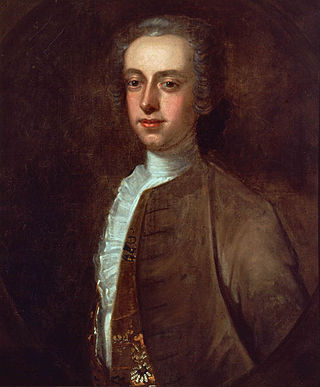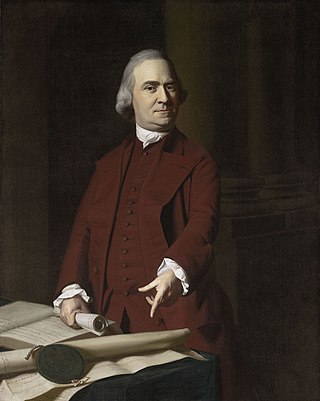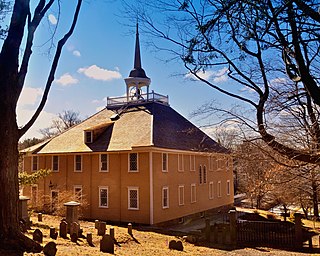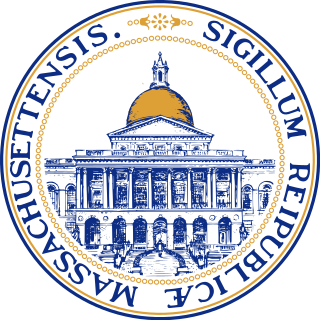Related Research Articles

Thomas Hutchinson was an American merchant, politician, historian, and colonial administrator who repeatedly served as governor of the Province of Massachusetts Bay in the years leading up to the American Revolution. He has been described as "the most important figure on the loyalist side in pre-Revolutionary Massachusetts". Hutchinson was a successful merchant and politician who was active at high levels of the Massachusetts colonial government for many years, serving as lieutenant governor and then governor from 1758 to 1774. He was a politically polarizing figure who came to be identified by John Adams and Samuel Adams as a supporter of unpopular British taxes, despite his initial opposition to Parliamentary tax laws directed at the colonies. Hutchinson was blamed by British Prime Minister Lord North for being a significant contributor to the tensions that led to the outbreak of the American Revolutionary War.

The Province of Massachusetts Bay was a colony in New England which became one of the thirteen original states of the United States. It was chartered on October 7, 1691, by William III and Mary II, the joint monarchs of the kingdoms of England, Scotland, and Ireland, and was based in the merging of several earlier British colonies in New England. The charter took effect on May 14, 1692, and included the Massachusetts Bay Colony, the Plymouth Colony, the Province of Maine, Martha's Vineyard, Nantucket, Nova Scotia, and New Brunswick; the Commonwealth of Massachusetts is the direct successor. Maine has been a separate state since 1820, and Nova Scotia and New Brunswick are now Canadian provinces, having been part of the colony only until 1697.

The Boston Brahmins or Boston elite are members of Boston's historic upper class. In the late 19th century through the mid-20th century, they were often associated with a cultivated New England accent, Harvard University, Anglicanism, and traditional British-American customs and clothing. Descendants of the earliest English colonists are typically considered to be the most representative of the Boston Brahmins. They are considered White Anglo-Saxon Protestants (WASPs).
Thomas Danforth was a politician, magistrate, and landowner in the Massachusetts Bay Colony. A conservative Puritan, he served for many years as one of the colony's councilors and magistrates, generally leading opposition to attempts by the English kings to assert control over the colony.

Otis C. Norcross served as the nineteenth Mayor of Boston, Massachusetts, from January 7, 1867 to January 6, 1868 during the Reconstruction era of the United States. Norcross was a candidate (1861) for the Massachusetts State House of Representatives; served as a member of the Boston Board of Aldermen from January 6, 1862 to January 2, 1865; chairman of the Boston Board of Aldermen from January 4, 1864 to January 2, 1865; and served as a trustee of the City Hospital, 1865 & 1866; and a member of the Massachusetts Governor's Council, under Gov. William Claflin (1869).
The Boston Board of Selectmen was the governing board for the town of Boston from the 17th century until 1822. Selectmen were elected to six-month terms early in the history of the board, but later were elected to one-year terms.

Samuel Adams was an American statesman, political philosopher, and a Founding Father of the United States. He was a politician in colonial Massachusetts, a leader of the movement that became the American Revolution, a signer of the Declaration of Independence and other founding documents, and one of the architects of the principles of American republicanism that shaped the political culture of the United States. He was a second cousin to his fellow Founding Father, President John Adams.
The Otis family is a Boston Brahmin family from Massachusetts best known for its involvement in early American politics.

Deacon John Leavitt (1608–1691) was a tailor, public officeholder, and founding deacon of Old Ship Church in Hingham, Plymouth County, Massachusetts, the only remaining 17th-century Puritan meeting house in America and the oldest church in continuous ecclesiastical use in the United States. Hingham's Leavitt Street is named for the early settler, whose descendants have lived in Hingham for centuries.

The Quincy family was a prominent political family in Massachusetts from the mid-17th century through to the early 20th century. It is connected to the Adams political family through Abigail Adams.

Elisha Cooke Jr. was a physician and politician from the Province of Massachusetts Bay. He was the son of Elisha Cooke Sr. (1637–1715), a wealthy Massachusetts physician and politician who was elected Speaker of the Massachusetts House of Representatives in 1683. He graduated from Harvard University in 1697.

Elisha Cooke was a wealthy Massachusetts physician, politician, and businessman who was elected Speaker of the Massachusetts Bay Assembly in 1683. He was the leader of the "popular party", a faction in the Massachusetts House that resisted encroachment by royal officials on colonial rights embodied in the Massachusetts Charter. This role was taken up by his son, Elisha Cooke Jr.
Samuel Adams Sr. (1689–1748) was an American brewer, father of American Founding Father Samuel Adams, and first cousin once removed of John Adams.
The 75th Massachusetts General Court, consisting of the Massachusetts Senate and the Massachusetts House of Representatives, met in 1854 during the governorship of Emory Washburn. Charles Edward Cook served as president of the Senate and Otis P. Lord served as speaker of the House.
The 88th Massachusetts General Court, consisting of the Massachusetts Senate and the Massachusetts House of Representatives, met in 1867 during the governorship of Republican Alexander Bullock. Joseph Adams Pond served as president of the Senate and James M. Stone served as speaker of the House.

The 61st Massachusetts General Court, consisting of the Massachusetts Senate and the Massachusetts House of Representatives, met in 1840 during the governorship of Marcus Morton. Daniel P. King served as president of the Senate and Robert Charles Winthrop served as speaker of the House.
The 29th Massachusetts General Court, consisting of the Massachusetts Senate and the Massachusetts House of Representatives, met in 1808 and 1809 during the governorship of Levi Lincoln Sr. Harrison Gray Otis served as president of the Senate and Timothy Bigelow served as speaker of the House. In 1808, the state legislature elected James Lloyd as the Class 1 United States Senator from Massachusetts to succeed John Quincy Adams following his resignation on June 8, 1808.

The 50th Massachusetts General Court, consisting of the Massachusetts Senate and the Massachusetts House of Representatives, met in 1829 during the governorship of Levi Lincoln Jr. Sherman Leland served as president of the Senate and William B. Calhoun served as speaker of the House.
James Atherton was an early settler and one of the founders of Lancaster, Massachusetts. He emigrated to the New England Colonies from the parish of Wigan, Lancashire, England, in 1635.